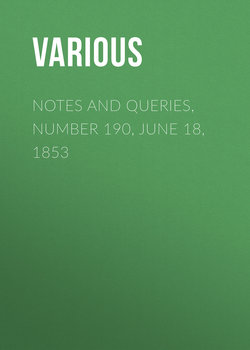Читать книгу Notes and Queries, Number 190, June 18, 1853 - Various - Страница 1
Notes
ON THE USE OF THE HOUR-GLASS IN PULPITS
ОглавлениеGeorge Herbert says:
"The parson exceeds not an hour in preaching, because all ages have thought that a competency."—A Priest to the Temple, p. 28.
Ferrarius, De Ritu Concion., lib. i. c. 34., makes the following statement:
"Huic igitur certo ac communi malo (the evil of too long sermons) ut medicinam facerent, Ecclesiæ patres in concionando determinatum dicendi tempus fereque unius horæ spatio conclusum aut ipsi sibi præscribant, aut ab aliis præfinitum religiosè observabant."
Bingham, commenting on this passage, observes:
"Ferrarius and some others are very positive that they (their sermons) were generally an hour long; but Ferrarius is at a loss to tell by what instrument they measured their hour, for he will not venture to affirm that they preached, as the old Greek and Roman orators declaimed, by an hour-glass."—See Bingham, vol. iv. p. 582.
This remark of Bingham's brings me at once to the subject of my present communication. What evidence exists of the practice of preaching by the hour-glass, thus treated as improbable, if not ridiculous, by the learned writer just quoted? If the early Fathers of the church timed their sermons by any instrument of the kind, we should expect their writings to contain internal evidence of the fact, just as frequent allusion is made by Demosthenes and other ancient orators to the klepshydra or water-clock, by which the time allotted to each speaker was measured. Besides, the close proximity of such an instrument would be a constant source of metaphorical allusion on the subject of time and eternity. Perhaps those of your readers who are familiar with the extant sermons of the Greek and Latin fathers, may be able to supply some illustration on this subject. At all events there appears to be indisputable evidence of the use of the hour-glass in the pulpit formerly in this country.
In an extract from the churchwardens' accounts of the parish of St. Helen, in Abingdon, Berks, we find the following entry:
"Anno mdxci. 34 Eliz. 'Payde for an houre-glasse for the pulpit,' 4d."—See Hone's Table-Book, vol. i. p. 482.
Among the accounts of Christ Church, St. Catherine's, Aldgate, under the year 1564, this entry occurs:
"Paid for an hour-glass that hangeth by the pulpitt when the preacher doth make a sermon that he may know how the hour passeth away."—Malcolm's Londinium, vol. iii. p. 309., cited Southey's Common-Place Book, 4th Series, p. 471.
In Fosbrooke (Br. Mon., p. 286.) I find the following passage:
"A stand for an hour-glass still remains in many pulpits. A rector of Bibury (in Gloucestershire) used to preach two hours, regularly turning the glass. After the text the esquire of the parish withdrew, smoaked his pipe, and returned to the blessing."
The authority for this, which Fosbrooke cites, is Rudder's Gloucestershire, in "Bibury." It is added that lecturers' pulpits have also hour-glasses The woodcuts in Hawkins's Music, ii. 332., are referred to in support of this statement. I regret that I have no means of consulting the two last-mentioned authorities.
In 1681 some poor crazy people at Edinburgh called themselves the Sweet Singers of Israel. Among other things, they renounced the limiting the Lord's mind by glasses. This is no doubt in allusion to the hour-glass, which Mr. Water, the editor of the fourth series of Southey's Common-Place Book, informs us is still to be found, or at least its iron frame, in many churches, adding that the custom of preaching by the hour-glass commenced about the end of the sixteenth century. I cannot help thinking that an earlier date must be assigned to this singular practice. (See Southey's Common-Place Book, 4th series, p. 379.) Mr. Water states that one of these iron frames still exists at Ferring in Sussex. The iron extinguishers still to be found on the railing opposite large houses in London, are a similar memorial of an obsolete custom.
I trust some contributor to the "N. & Q." will be able to supply farther illustrations of this custom. Should it be revived in our own times, I fear most parishes would supply only a half-hour glass for the pulpit of their church, however unanimous antiquity may be in favour of sermons of an hour's duration. One advantage presented by this ancient and precise practice was, that the squire of the parish knew exactly when it was time to put out his pipe and return for the blessing, which he cannot ascertain under the present uncertain and indefinite mode of preaching. Fosbrooke (Br. Mon., p. 286.) states that the priest had sometimes a watch found for him by the parish. The authority cited for this is the following entry in the accounts of the Chantrey Wardens of the parish of Shire in Surrey:
"Received for the priest's watch after he was dead, 13s. 4d."—Manning's Surrey, vol. i. p. 531.
This entry seems to be rather too vague and obscure to warrant the inference drawn from it. This also may be susceptible of farther illustration.
A. W. S.
Temple.
